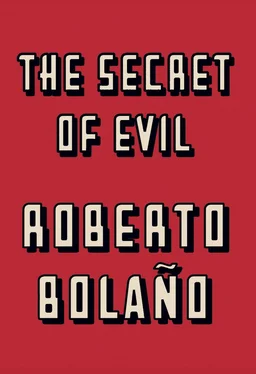Some of his works were shown in 2003, during the European protests against the war in Iraq, at an exhibition organized by the poet Ponç Altés: mere sketches, as the artist pointed out himself, trials, private exercises done in some anonymous and dingy room. About Vallirana, there is little to be said: he was young, just twenty-one, unemployed, and he came from a family that was relatively poor (but loving: they supported him). His literary tastes were still developing, although he had, by then, read the complete works of Alfred Jarry, his favorite writer, whose radiance the passing days could do nothing to dim. As to Vallirana’s personality at that time, the accounts diverge. Generally speaking, it could be said that he was a somewhat (though not excessively) reserved young man and somewhat shy (although his shyness was not excessive either). He believed only in art and science. For him, the union of art and science was a matter of work . In that sense it could be said that he was deeply Catalonian. God and chance belonged to art, eternity and labyrinths to science. When the protests against the war in Iraq began, he spent three days shut up in his room, like those young men in Japan who retreat to a tiny bedroom in the family home and refuse to come out again to look for work or go shopping or see a movie or take a walk in the park. Being an only child and living in El Masnou, not Tokyo, Vallirana had a larger bedroom, and he spent only three days in there, watching television almost nonstop (there was a set at the foot of his bed), barely sleeping, following the protests, and thinking. When the three days were over, he went up onto the roof and made a little sign. The sign said: “NO WAR — LONG LIVE SADDAM HUSSEIN.” He wrote it in Roman square capitals — the result was rather stylish — on a modest-sized sheet of white cardboard, which he stapled onto a wooden stick about four feet long. In a moment of malicious inspiration, he illustrated both sides of the sign with little flowers that looked more like four-leafed clovers. The next day he took the train to Barcelona and participated in an anti-war demonstration in Hospitalet, which was poorly attended, but that night he joined the crowd banging pots and pans in Plaza San Jaume, and held his sign up high. No one said anything to him in Hospitalet. Or in Plaza San Jaume, where Vallirana contributed powerfully to the racket with an umpire’s whistle. He missed the last train back to El Masnou and slept on a bench in the subway along with the homeless. The next day he took part in a march with students from the Universidad Autónoma, who chanted antiwar and anti-US slogans as they walked from the campus to Sarrià, stopping the traffic on numerous occasions. A girl who was studying journalism came up to him as they crossed one of the ring roads and said that she was against the war but that didn’t mean she supported Saddam Hussein. The girl was called Dolors, and Vallirana told her that his name was Enric de Montherlant. When the demonstration was over, they went to have coffee on Plaza de Sarrià, and agreed to meet the following day and join the big march from the Rambla de Catalunya to Plaza Catalunya. Then Vallirana went back to El Masnou, where he took a shower and changed his clothes, vaguely suspecting that he had picked up fleas the previous night. His whole body was, as it turned out, covered with tiny, bright red bites. Before going to sleep, Vallirana made a great many notes. He asked himself questions. And he didn’t choose the lazy solution of leaving them all unanswered. When he’d finished writing, he went up to the rooftop terrace and made another sign. This one said: “NO WAR — LONG LIVE THE IRAQI PEOPLE — DEATH TO THE JEWS.” The first phrase, NO WAR, was written in big letters, the second in smaller ones, and the third in letters that were smaller again. The characters had curves and twists that were vaguely reminiscent of Arabic script. Comic-book Arabic script. On both sides of the sign he drew peace symbols. When he had finished he said to himself: Now let’s see what happens. Then he dined on a ham sandwich and tomato bread, and shut himself in his room and masturbated, thinking about Dolors, until he fell asleep, the TV on with the volume turned down so as not to bother his parents. First thing the next morning he caught a train. In his carriage there were laborers and students, but mainly commuters on the way to the office, men wearing ties and women in respectable, ugly suits, although, here and there, he could see a few people dressed with a little more taste, who didn’t seem completely resigned to leading failed lives. These individuals seemed to have staked everything on sex and seduction, on attracting and being attracted, which wasn’t much, thought Vallirana, but at least it was something. The others made a pitiful showing: women with glasses and too much fat on their hips and thighs, men who could only inspire disgust if they stripped off in a bedroom. As for the laborers, who were easily identifiable by their blue or yellow overalls and their lunch boxes or foil-wrapped sandwiches, they seemed to be in another world; and to a large extent they were, since most of them were immigrants from Africa or South America, who didn’t care what the Spanish were doing. The students were dozing or going over their notes. When the train went into the tunnel in Barcelona, before reaching the Arco del Triunfo station, Vallirana shouted, “No war!” Some of the passengers, it seemed, were woken by the shout, and others were scared, but after the initial moment of surprise, almost everyone in the carriage responded by taking up the cry: “No war!”
1. The title . In theory, and with no input from me whatsoever, the title of my talk was supposed to be “Where does the new Latin American novel come from?” If I stay on topic, my answer will be about three minutes long. We come from the middle classes or from a more or less settled proletariat or from families of low-level drug traffickers who’re tired of gunshots and want respectability instead. As Pere Gimferrer says: in the old days, writers came from the upper classes or the aristocracy, and by choosing literature they chose — at least for a certain period that might be a lifetime or four or five years — social censure, the destruction of learned values, mockery and constant criticism. Now, on the other hand, especially in Latin America, writers come from the lower middle classes or from the ranks of the proletariat and what they want, at the end of the day, is a light veneer of respectability. That is, writers today seek recognition, though not the recognition of their peers but of what are often called “political authorities,” the usurpers of power, whatever century it is (the young writers don’t care!), and thereby the recognition of the public, or book sales, which makes publishers happy but makes writers even happier, because these are writers who, as children at home, saw how hard it is to work eight hours a day, or nine or ten, which was how long their parents worked, and this was when there was work, because the only thing worse than working ten hours a day is not being able to work at all and having to drag oneself around looking for a job (paid, of course) in the labyrinth, or worse, in the hideous crossword puzzle of Latin America. So young writers have been burned, as they say, and they devote themselves body and soul to selling. Some rely more on their bodies, others on their souls, but in the end it’s all about selling. What doesn’t sell? Ah, that’s an important consideration. Disruption doesn’t sell. Writing that plumbs the depths with open eyes doesn’t sell. For example: Macedonio Fernández doesn’t sell. Macedonio may have been one of Borges’s three great teachers (and Borges is or should be at the center of our canon) but never mind that. Everything says that we should read him, but Macedonio doesn’t sell, so forget him. If Lamborghini doesn’t sell, so much for Lamborghini. Wilcock is only known in Argentina and only by a few lucky readers. Forget Wilcock, then. Where does the new Latin American literature come from? The answer is very simple. It comes from fear. It comes from the terrible (and in a certain way fairly understandable) fear of working in an office and selling cheap trash on the Paseo Ahumada. It comes from the desire for respectability, which is simply a cover for fear. To those who don’t know any better, we might seem like extras from a New York gangster movie, always talking about respect. Frankly, at first glance we’re a pitiful group of writers in our thirties and forties, along with the occasional fifty-year-old, waiting for Godot, which in this case is the Nobel, the Rulfo, the Cervantes, the Príncipe de Asturias, the Rómulo Gallegos.
Читать дальше












